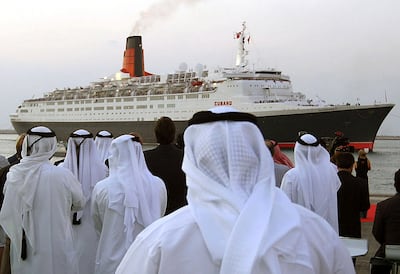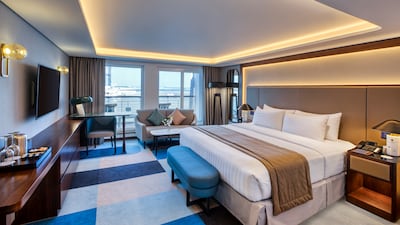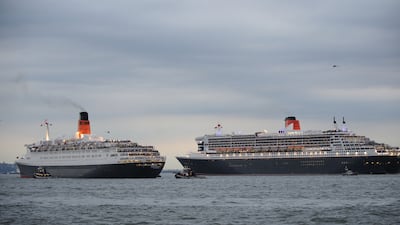On October 16, 2008, large crowds gathered at New York Harbour to bid a final farewell to Queen Elizabeth 2. The then 40-year-old ocean liner had just completed its 806th transatlantic journey – and its 710th stop in New York – and was heading home to Southampton in the UK, before retiring in Dubai, where it would become a luxury hotel.
Joining the QE2 on its final journey, and leading her out to the ocean, was its successor, Queen Mary 2. Then only four years old, the QM2 was taking over owner Cunard Line's transatlantic service from UK to the US, a route the QE2 had served since 1969.
As the two ships made their exit, geysers from a flotilla of tug boats saluted them as helicopters hovered above. The goodbye was signalled by three short blasts from the QE2 whistles, The New York Times wrote at the time. At Battery Park City next to the Hudson River, bagpipers played a musical tribute while several hundred people waved small Union flags and cheered as the two ships sailed passed the Statue of Liberty, it added.
The QE2 was fully booked for its final journey from the US, with about 1,800 passengers paying fares ranging from $25,445 for a duplex grand suite with a veranda, to $2,992 for a single room. Its crew of 1,016 included 107 cooks, four fitness instructors, a DJ and 10 gentlemen hosts.
The QE2 retired from active service on November 11, 2008, when it left Southampton Docks and set sail for its final journey to Dubai. Demand was so great for the journey to the UAE that tickets sold out in just 36 minutes.
“It’s like the Concorde effect. That was a travel icon and the QE2 is the same ilk and people want to experience it,” said Stefan Shillito, the then managing director of cruise agency Sovereign Cruise Club.
A flotilla of 60 naval vessels and private boats met the 70,000-tonne ship in the Arabian Gulf as she arrived in her new Dubai home on November 26, 2008. They were led by My Dubai, a mega yacht owned by Sheikh Mohammed bin Rashid, Vice President and Ruler of Dubai. An Emirates A380 Airbus and a helicopter from the UK's Royal Navy performed a fly-past in honour of her arrival. But, the QE2's new life as a floating hotel would be delayed by the 2008 financial crisis.
On April 18, 2018, a new chapter finally began for the world-famous ship. After more than 1,400 voyages and years of rumours about her fate, she opened her doors to a new generation of guests as a floating hotel at Dubai’s Port Rashid. French multinational Accor took over the management in 2022 and announced large-scale upgrades and renovations to the property.
There are now 447 rooms and suites available to book, from entry-level cabins to decadent Royal Suites, which have hosted famous faces such as Joan Collins and the late Nelson Mandela. The QE2’s origins and adventures via books, photos, uniforms and artefacts are now preserved in the ship's museum called Travellers’ Cove.
UAE squad
Esha Oza (captain), Al Maseera Jahangir, Emily Thomas, Heena Hotchandani, Indhuja Nandakumar, Katie Thompson, Lavanya Keny, Mehak Thakur, Michelle Botha, Rinitha Rajith, Samaira Dharnidharka, Siya Gokhale, Sashikala Silva, Suraksha Kotte, Theertha Satish (wicketkeeper) Udeni Kuruppuarachchige, Vaishnave Mahesh.
UAE tour of Zimbabwe
All matches in Bulawayo
Friday, Sept 26 – First ODI
Sunday, Sept 28 – Second ODI
Tuesday, Sept 30 – Third ODI
Thursday, Oct 2 – Fourth ODI
Sunday, Oct 5 – First T20I
Monday, Oct 6 – Second T20I
Profile of VoucherSkout
Date of launch: November 2016
Founder: David Tobias
Based: Jumeirah Lake Towers
Sector: Technology
Size: 18 employees
Stage: Embarking on a Series A round to raise $5 million in the first quarter of 2019 with a 20 per cent stake
Investors: Seed round was self-funded with “millions of dollars”
More from Neighbourhood Watch:
The specs: 2018 BMW R nineT Scrambler
Price, base / as tested Dh57,000
Engine 1,170cc air/oil-cooled flat twin four-stroke engine
Transmission Six-speed gearbox
Power 110hp) @ 7,750rpm
Torque 116Nm @ 6,000rpm
Fuel economy, combined 5.3L / 100km
Scores
Oman 109-3 in 18.4 overs (Aqib Ilyas 45 not out, Aamir Kaleem 27) beat UAE 108-9 in 20 overs (Usman 27, Mustafa 24, Fayyaz 3-16, Bilal 3-23)
Tewellah by Nawal Zoghbi is out now.
Ponti
Sharlene Teo, Pan Macmillan
About Housecall
Date started: July 2020
Founders: Omar and Humaid Alzaabi
Based: Abu Dhabi
Sector: HealthTech
# of staff: 10
Funding to date: Self-funded
Most sought after workplace benefits in the UAE
- Flexible work arrangements
- Pension support
- Mental well-being assistance
- Insurance coverage for optical, dental, alternative medicine, cancer screening
- Financial well-being incentives
Formula%204%20Italian%20Championship%202023%20calendar
%3Cp%3EApril%2021-23%3A%20Imola%3Cbr%3EMay%205-7%3A%20Misano%3Cbr%3EMay%2026-28%3A%20SPA-Francorchamps%3Cbr%3EJune%2023-25%3A%20Monza%3Cbr%3EJuly%2021-23%3A%20Paul%20Ricard%3Cbr%3ESept%2029-Oct%201%3A%20Mugello%3Cbr%3EOct%2013-15%3A%20Vallelunga%3C%2Fp%3E%0A
The%20specs%20
%3Cp%3E%3Cstrong%3EEngine%3A%20%3C%2Fstrong%3E2.0-litre%204cyl%20turbo%0D%3Cbr%3E%3Cstrong%3EPower%3A%20%3C%2Fstrong%3E261hp%20at%205%2C500rpm%0D%3Cbr%3E%3Cstrong%3ETorque%3A%20%3C%2Fstrong%3E400Nm%20at%201%2C750-4%2C000rpm%0D%3Cbr%3E%3Cstrong%3ETransmission%3A%20%3C%2Fstrong%3E7-speed%20dual-clutch%20auto%0D%3Cbr%3E%3Cstrong%3EFuel%20consumption%3A%20%3C%2Fstrong%3E10.5L%2F100km%0D%3Cbr%3E%3Cstrong%3EOn%20sale%3A%20%3C%2Fstrong%3ENow%0D%3Cbr%3E%3Cstrong%3EPrice%3A%20%3C%2Fstrong%3EFrom%20Dh129%2C999%20(VX%20Luxury)%3B%20from%20Dh149%2C999%20(VX%20Black%20Gold)%3C%2Fp%3E%0A
If you go
The flights
Return flights from Dubai to Santiago, via Sao Paolo cost from Dh5,295 with Emirates.
The trip
A five-day trip (not including two days of flight travel) was split between Santiago and in Puerto Varas, with more time spent in the later where excursions were organised by TurisTour.
When to go
The summer months, from December to February are best though there is beauty in each season
SCORES IN BRIEF
New Zealand 153 and 56 for 1 in 22.4 overs at close
Pakistan 227
(Babar 62, Asad 43, Boult 4-54, De Grandhomme 2-30, Patel 2-64)
SPECS
%3Cp%3E%3Cstrong%3EEngine%3A%3C%2Fstrong%3E%20Dual%20electric%20motors%20with%20102kW%20battery%20pack%3C%2Fp%3E%0A%3Cp%3E%3Cstrong%3EPower%3A%20%3C%2Fstrong%3E570hp%3C%2Fp%3E%0A%3Cp%3E%3Cstrong%3ETorque%3A%3C%2Fstrong%3E%20890Nm%3C%2Fp%3E%0A%3Cp%3E%3Cstrong%3ERange%3A%3C%2Fstrong%3E%20Up%20to%20428km%3C%2Fp%3E%0A%3Cp%3E%3Cstrong%3EOn%20sale%3A%3C%2Fstrong%3E%20Now%3C%2Fp%3E%0A%3Cp%3E%3Cstrong%3EPrice%3A%20%3C%2Fstrong%3EFrom%20Dh1%2C700%2C000%3C%2Fp%3E%0A
57%20Seconds
%3Cp%3E%3Cstrong%3EDirector%3A%3C%2Fstrong%3E%20Rusty%20Cundieff%0D%3Cbr%3E%3Cstrong%3EStars%3A%20%3C%2Fstrong%3EJosh%20Hutcherson%2C%20Morgan%20Freeman%2C%20Greg%20Germann%2C%20Lovie%20Simone%0D%3Cbr%3E%3Cstrong%3ERating%3A%20%3C%2Fstrong%3E2%2F5%0D%3Cbr%3E%0D%3Cbr%3E%3C%2Fp%3E%0A
Padmaavat
Director: Sanjay Leela Bhansali
Starring: Ranveer Singh, Deepika Padukone, Shahid Kapoor, Jim Sarbh
3.5/5
The%20BaaS%20ecosystem
%3Cp%3EThe%20BaaS%20value%20chain%20consists%20of%20four%20key%20players%3A%3C%2Fp%3E%0A%3Cp%3E%3Cstrong%3EConsumers%3A%3C%2Fstrong%3E%20End-users%20of%20the%20financial%20product%20delivered%3C%2Fp%3E%0A%3Cp%3E%3Cstrong%3EDistributors%3A%3C%2Fstrong%3E%20Also%20known%20as%20embedders%2C%20these%20are%20the%20firms%20that%20embed%20baking%20services%20directly%20into%20their%20existing%20customer%20journeys%3C%2Fp%3E%0A%3Cp%3E%3Cstrong%3EEnablers%3A%3C%2Fstrong%3E%20Usually%20Big%20Tech%20or%20FinTech%20companies%20that%20help%20embed%20financial%20services%20into%20third-party%20platforms%3C%2Fp%3E%0A%3Cp%3E%3Cstrong%3EProviders%3A%3C%2Fstrong%3E%20Financial%20institutions%20holding%20a%20banking%20licence%20and%20offering%20regulated%20products%3C%2Fp%3E%0A
Company%20Profile
%3Cp%3E%3Cstrong%3ECompany%3A%3C%2Fstrong%3E%20Astra%20Tech%3Cbr%3E%3Cstrong%3EStarted%3A%20%3C%2Fstrong%3EMarch%202022%3Cbr%3E%3Cstrong%3EBased%3A%20%3C%2Fstrong%3EDubai%3Cbr%3E%3Cstrong%3EFounder%3A%20%3C%2Fstrong%3EAbdallah%20Abu%20Sheikh%3Cbr%3E%3Cstrong%3EIndustry%3A%3C%2Fstrong%3E%20technology%20investment%20and%20development%3Cbr%3E%3Cstrong%3EFunding%20size%3A%3C%2Fstrong%3E%20%24500m%3C%2Fp%3E%0A
Muslim Council of Elders condemns terrorism on religious sites
The Muslim Council of Elders has strongly condemned the criminal attacks on religious sites in Britain.
It firmly rejected “acts of terrorism, which constitute a flagrant violation of the sanctity of houses of worship”.
“Attacking places of worship is a form of terrorism and extremism that threatens peace and stability within societies,” it said.
The council also warned against the rise of hate speech, racism, extremism and Islamophobia. It urged the international community to join efforts to promote tolerance and peaceful coexistence.
The Outsider
Stephen King, Penguin
GREATEST ROYAL RUMBLE CARD
The line-up as it stands for the Greatest Royal Rumble in Saudi Arabia on April 27
50-man Royal Rumble
Universal Championship
Brock Lesnar (champion) v Roman Reigns
Casket match
The Undertaker v Rusev
Intercontinental Championship
Seth Rollins (champion) v The Miz v Finn Balor v Samoa Joe
SmackDown Tag Team Championship
The Bludgeon Brothers v The Usos
Raw Tag Team Championship
Sheamus and Cesaro v Bray Wyatt and Matt Hardy
United States Championship
Jeff Hardy (champion) v Jinder Mahal
Singles match
Triple H v John Cena
To be confirmed
AJ Styles will defend his WWE World Heavyweight title and Cedric Alexander his Cruiserweight Championship, but matches have yet to be announced
The National's picks
4.35pm: Tilal Al Khalediah
5.10pm: Continous
5.45pm: Raging Torrent
6.20pm: West Acre
7pm: Flood Zone
7.40pm: Straight No Chaser
8.15pm: Romantic Warrior
8.50pm: Calandogan
9.30pm: Forever Young
SPECS
Toyota land Cruiser 2020 5.7L VXR
Engine: 5.7-litre V8
Transmission: eight-speed automatic
Power: 362hp
Torque: 530Nm
Price: Dh329,000 (base model 4.0L EXR Dh215,900)
12%20restaurants%20opening%20at%20the%20hotel%20this%20month
%3Cp%3EAriana%E2%80%99s%20Persian%20Kitchen%3Cbr%3EDinner%20by%20Heston%20Blumenthal%3Cbr%3EEstiatorio%20Milos%3Cbr%3EHouse%20of%20Desserts%3Cbr%3EJaleo%20by%20Jose%20Andres%3Cbr%3ELa%20Mar%3Cbr%3ELing%20Ling%3Cbr%3ELittle%20Venice%20Cake%20Company%3Cbr%3EMalibu%2090265%3Cbr%3ENobu%20by%20the%20Beach%3Cbr%3EResonance%20by%20Heston%20Blumenthal%3Cbr%3EThe%20Royal%20Tearoom%C2%A0%3C%2Fp%3E%0A
Profile of Hala Insurance
Date Started: September 2018
Founders: Walid and Karim Dib
Based: Abu Dhabi
Employees: Nine
Amount raised: $1.2 million
Funders: Oman Technology Fund, AB Accelerator, 500 Startups, private backers
If you go...
Etihad Airways flies from Abu Dhabi to Kuala Lumpur, from about Dh3,600. Air Asia currently flies from Kuala Lumpur to Terengganu, with Berjaya Hotels & Resorts planning to launch direct chartered flights to Redang Island in the near future. Rooms at The Taaras Beach and Spa Resort start from 680RM (Dh597).










